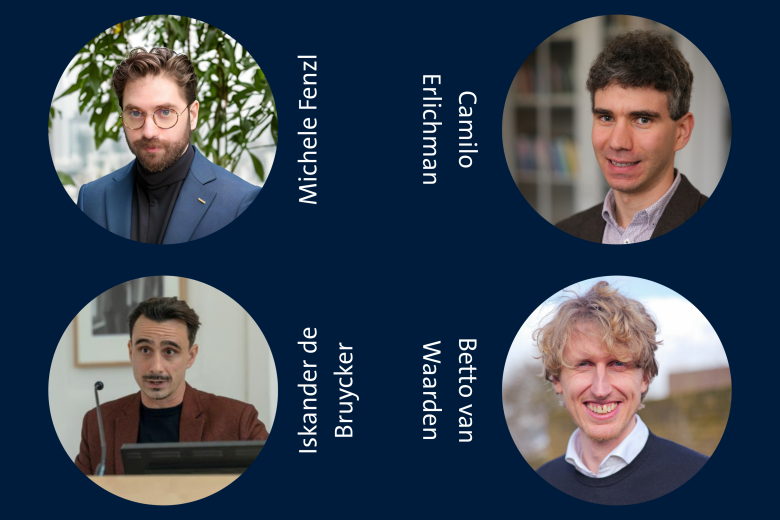Honorary laureate Michael Ignatieff on freedom and democracy
The rise of conservative nationalism in Hungary has forced the Central European University (CEU) to withdraw to Vienna. However, CEU will continue to spread its message of freedom, democracy and independent thinking. “People are at their best when they’re allowed to be free”, says CEU rector and president Michael Ignatieff.
A historian by training, Ignatieff has held senior academic posts at the universities of Cambridge, Oxford, Harvard and Toronto. He also made a name for himself as a broadcaster, politician and writer. Above all, he is renowned as an eloquent and outspoken advocate for scientific freedom, liberal values and an open society. Maastricht University will award him an honorary doctorate at its Dies Natalis on 25 January.
Sign of support
Ignatieff sees the award as a clear signal of support for his institution, which is currently at loggerheads with Hungary’s right-wing nationalist government led by President Viktor Orbán. “I think Maastricht is saying, ‘This is a battle of European dimensions, and the freedoms that one university enjoys ought to be available to other universities.’ Every university in Europe ought to be free from the kind of overtly political manipulation and intimidation that we’ve been subjected to”, he says. “I’ll accept the doctorate not just in my own name but on behalf of CEU, and it will be very meaningful to everybody here.”
Founded by the philanthropist George Soros, a supporter of progressive liberal causes, and imbued with the spirit of Karl Popper’s Open Society, CEU has been threatened with closure. As the Hungarian government prevents it from operating as a free, US-accredited institution, the university has been forced to move to Vienna. However, Ignatieff is adamant that CEU should maintain a presence in Hungary, operating as a Hungarian institution and subjected to the regulations imposed by the government on higher education.
Reasons for hope
Populism, nationalism, Brexit, migration – Europe is facing turbulent times. Ironically, CEU is running a public lecture series this year titled ‘Reasons for Hope’. “I think there are lots of good reasons for hope”, Ignatieff explains. “With the emphasis on reasons. Universities are in the business of teaching students what good reasons are and how to distinguish them from bad ones. Good reasons are always connected to a firm grasp of knowledge. What we need to preserve freedom, to save the climate, to save democratic institutions, is knowledge, and we need to teach citizens how and where to find it. We’re living in a world with a huge political battle over what is true and what is false, and universities are at the centre of this battle. Providing good reasons is our mission.”
Fostering freedom
His experience as a writer, politician and professor has made him a passionate believer in the importance of freedom – but he is also acutely aware of its vulnerability. As it was put by the thinker Isaiah Berlin, the subject of a biography by Ignatieff, freedom is a ‘chilly virtue’.
“It’s also hard to think for yourself, to resist the tide, to not be swept away by the passions and hatred that sweep through all societies. Freedom is a discipline, it’s an arduous business, but people are at their best when they’re allowed to be free, to speak in their own name and fight for what they think is right. I don’t think that times are worse today than they were when I was younger and half the world was dominated by the communist system. We face enormous perils today, but the battle is the same: to defend and enlarge the space for human freedom.”
In that sense, Ignatieff remains optimistic even about issues like Brexit, “where you have a great society with a tremendous political tradition agonising about its future on a fundamental question. It’s chaotic, but this is what freedom looks like. It’s messy, frightening, chilly, uncertain, but I prefer that to tyranny any day of the week.”
Eyes lighting up
Ignatieff describes himself as a preternatural optimist. “And I love optimism in others. One thing that keeps you eternally young in a university is that you’re in daily contact with young people, who believe that life can be better than it is. And that continually recharges your own optimism.”
He would love to spend more time in the classroom. “Of all the things I’ve ever done in my life, the most exciting and rewarding thing is being a teacher. Classrooms are where universities do their most essential work. There’s great work going on in Maastricht classrooms and I’m very sceptical of mass enrolment, online courses. The teaching relationship is very personal and there’s nothing more satisfying than that moment when you get it right and a student’s eyes light up. It’s what you live for.”
By: Theo Tamis
More about Michael Ignatieff's lecture on Open Societies and the Ordinary Virtues on 24 January.
Also read
-
Four FASoS researchers awarded NWO XS grants
How do lobbyists use disinformation to sway policymakers? Who gets to shape the historical narrative of occupation and violence? Does growing inequality change the way citizens think about politics? And how have politicians defended “truth” across a century of media revolutions?
-
Reducing the Digital Divide: Empowering Students to Train, Evaluate, and Use AI Text Models
The Maastricht Law and Tech Lab, together with the Brightlands Institute for Smart Society (BISS), obtained a € 100.000 a Comenius Senior Teaching Fellow grant.
-
Green school playgrounds boost concentration and wellbeing
Children at schools with green playgrounds are better able to concentrate and display more social behaviour. This is the conclusion of a follow-up study within the long-running project The Healthy Primary School of the Future .